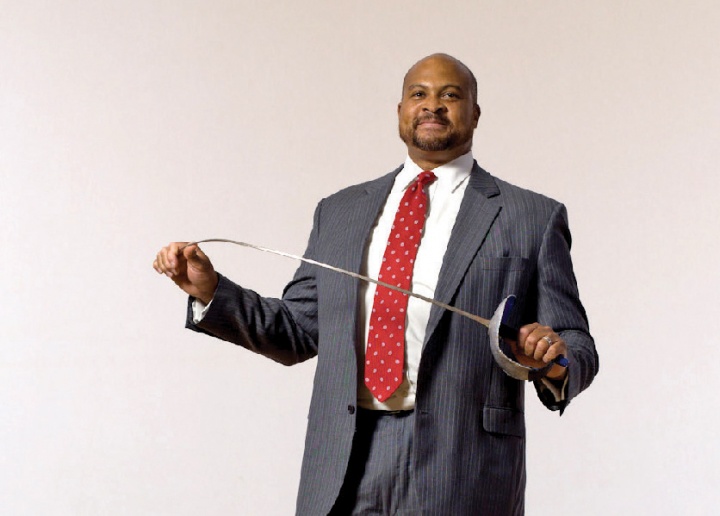Columbia College | Columbia University in the City of New York
Fencer and Business Owner Bob Cottingham Jr. ’88 Leads in Both Roles
Bob Cottingham Jr. ’88 says his fencing career, which peaked when he was a member of the 1988 and 1992 U.S. Olympic teams, has directly informed how he manages his rapidly growing global consulting business, Sabre88. And his longtime philanthropic work, both with Columbia’s fencing team and with the Peter Westbrook Foundation, is helping to develop a new generation of fencers.

Bob Cottingham Jr. ’88 uses skills from his fencing career in his business, aptly named Sabre88.
LOIS GREENFIELD
Cottingham, a history major with a 1994 law degree from Rutgers, came to fencing after his older sister promised her high school fencing coach at Montclair (N.J.) Kimberley Academy that her brother would try the sport. “I took on the challenge,” says the effervescent Cottingham. “And fencing made Sabre88.”
Founded by Cottingham in 2008 as a one-man bedroom operation in Newark, N.J., Sabre88 — named for his weapon and for an important year in his life: his College class year, his first Olympics and the year he won the NCAA individuals — was named the 16th fastest-growing inner city business last year in Fortune’s “Inner City 100.” Sabre88 works with both commercial and federal government clients, among them the Navy, the Nuclear Regulatory Commission and the General Services Administration. With nearly 50 employees based on government and client sites, and $2.5 million in revenue in 2014, Sabre88 has experienced 672 percent growth since 2012. Last year, Inc.’s annual “Inc. 5000” list of the nation’s fastest growing private companies ranked Sabre88 671st, and among the top 10 fastest-growing companies led by an African- American CEO.
For Cottingham, who was named by The U.S Small Business Administration as “New Jersey’s 2015 Minority Small Business Person of the Year,” customer service is Sabre88’s backbone. He tailors the execution of each contract to each client, a skill he honed in prior jobs: serving as a district director for former Rep. Donald Payne (D-N.J.) from 1996 to 2004 and helping grow Phacil, a technology services government contractor, from a company with five employees in 2004 to 850 in 2008.
But even more than those experiences, Cottingham credits fencing for his ability to respond quickly and effectively to challenges.
“Fencing helped me think strategically,” says Cottingham, who as a College student navigated schoolwork while being on both the Columbia and U.S. fencing teams. He competed nationally and internationally, was team captain junior and senior years, and was NCAA Fencer of the Year in 1988 after winning individuals and helping lead Columbia to an NCAA Championship for the second consecutive year. In 2010, he was inducted into the Columbia University Athletics Hall of Fame.
Each time Sabre88 wins a contract, because of its work with the federal government on a multi-state level with separate rules and regulations in each state, Cottingham has to ensure that everything — from benefits to compensation to time off and sick days — is in compliance with the law. For example, during January’s massive East Coast snowstorm, some of Cottingham’s employees were permitted to telecommute while others were not, given the strictly regulated nature of the material with which they work.
“The recovery is what is so critical,” Cottingham says, noting how this vital fencing skill informs his ability to respond daily at work. “That’s what really drives me — the fight.”
When he’s not traveling to meet with each employee quarterly, Cottingham arrives to Sabre88 headquarters, at New Jersey Institute of Technology’s Enterprise Development Center, between 7:30 a.m. and 8:00 a.m. Because every day brings on different challenges, he’s always prepared to connect with customers, and eager for good reviews. These feel to him like winning a fencing tournament, as all contracts thus far have been referrals, he says.
Columbia fencing teammate Marc Oshima ’91 calls Cottingham a fierce, passionate competitor. “Bob has always been the consummate role model and leader, setting an example around the championship mentality,” says Oshima. “He challenged all of us to be competing against the world, not just the University … What he helped foster was a culture of winning.”
Oshima has relished watching his friend give back by his support of the Columbia alumni fencing club and current team, both financially and by mentoring current, past and incoming fencing students.
Many of the fencers Cottingham mentors began their careers as kids at the Peter Westbrook Foundation, which Cottingham has been a part of since its inception 25 years ago, as a founder, and for which he now is chairman of the board. The foundation, based in New York City, teaches fencing to youth from underserved communities. “Each Saturday, I get into the weeds by coaching the beginner sabre class with Akhi Spencer-El, a Columbia assistant coach and former foundation student,” says Cottingham, who wears Columbia blue on those days.
Even Cottingham’s children — Bobby (17) and Alison (14) — fence with the foundation as well as for Montclair Kimberley Academy, where Cottingham met his wife, also named Alison, in ninth grade. Cottingham says his employees know how important fencing is to him, and how passionate he is about the foundation. “I get to serve in leadership in two different capacities, and each one informs the other,” he says.
Caroline Rothstein JRN’10 is a New York City-based writer, performer, activist and arts educator. She tours internationally performing spoken word poetry, and her work has appeared in BuzzFeed, Narratively, Williams Magazine and elsewhere.
Issue Contents
Published three times a year by Columbia College for alumni, students, faculty, parents and friends.
Columbia Alumni Center
622 W. 113th St., MC 4530, 6th Fl.
New York, NY 10025
212-851-7852
cct@columbia.edu
Columbia Alumni Center
622 W. 113th St., MC 4530, 4th Fl.
New York, NY 10025
212-851-7488
ccalumni@columbia.edu

